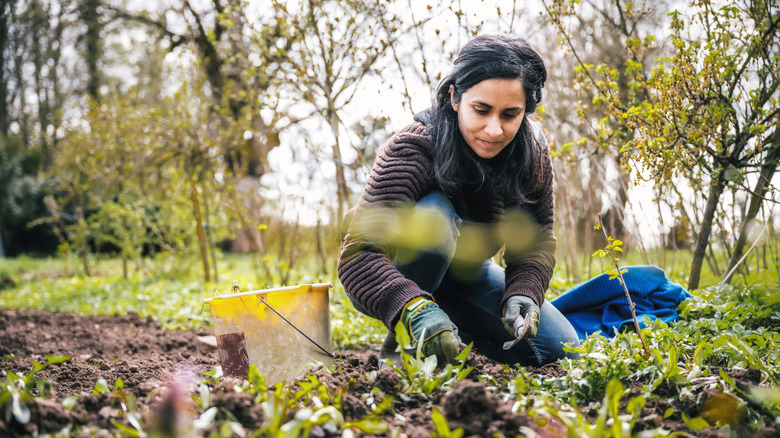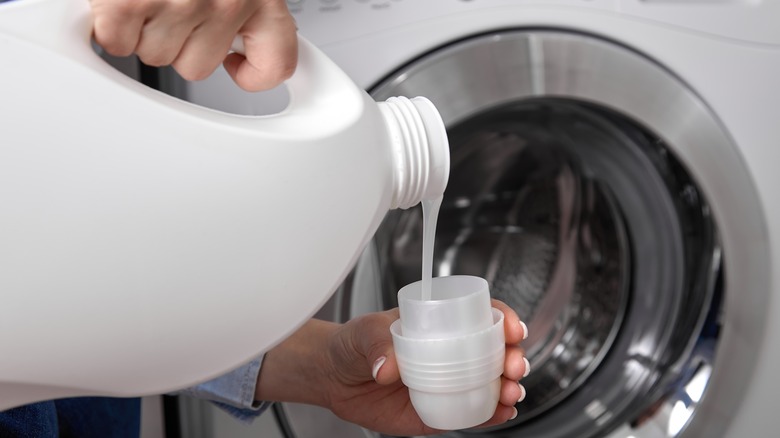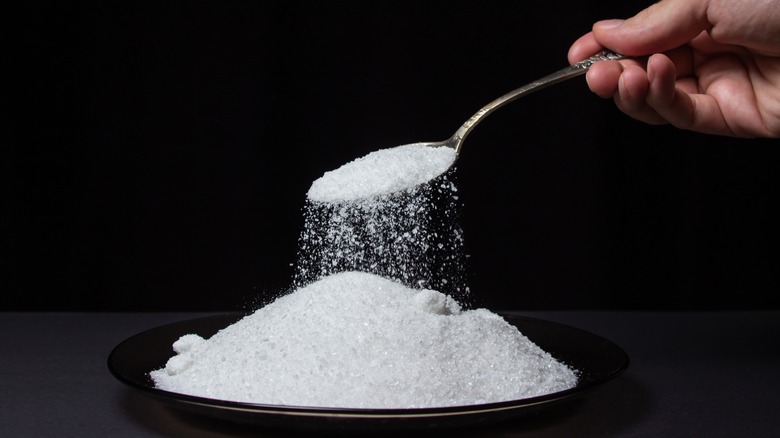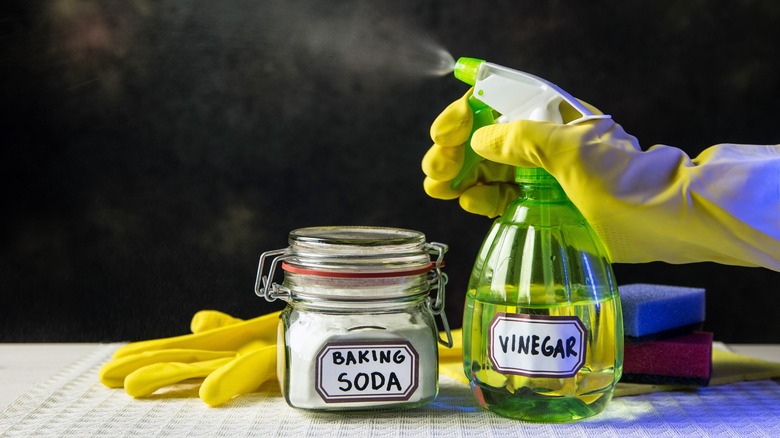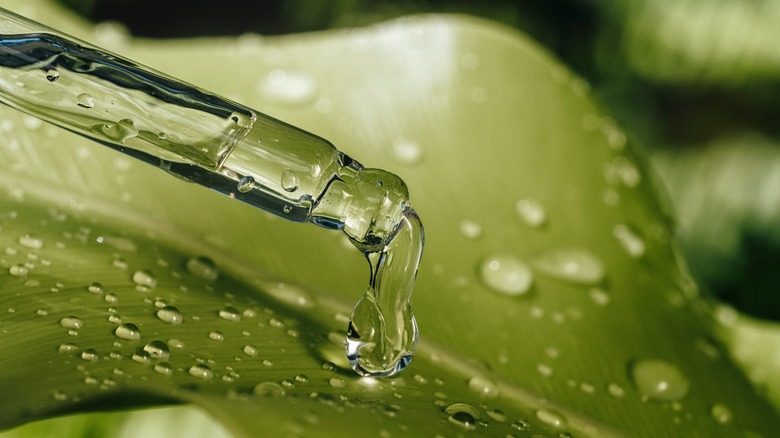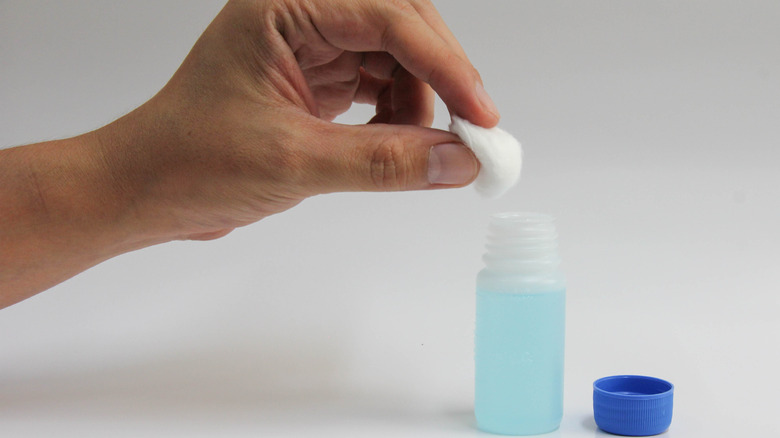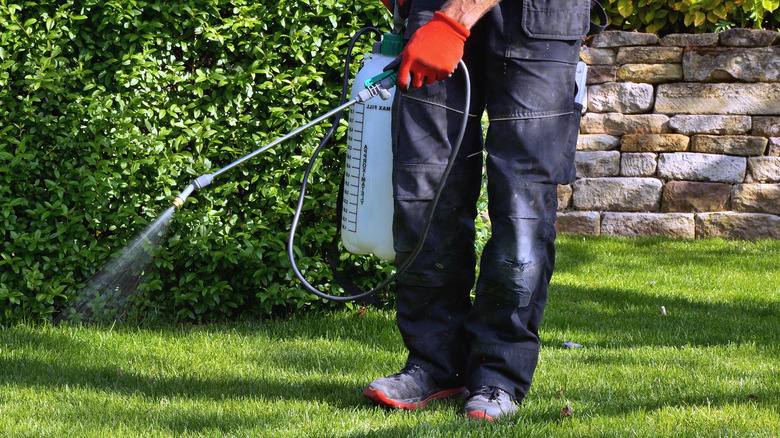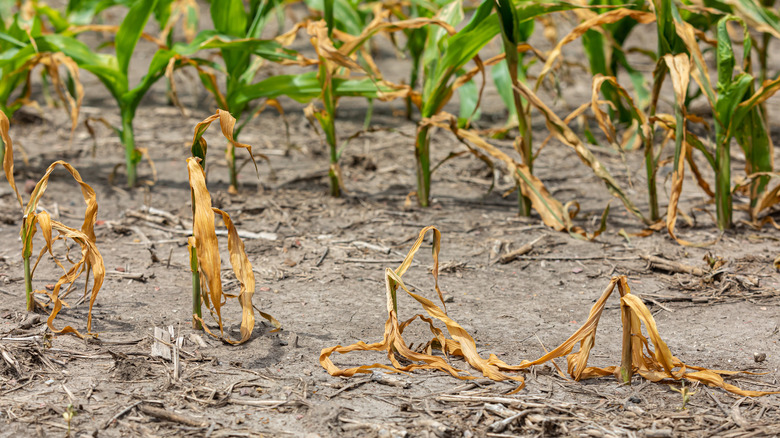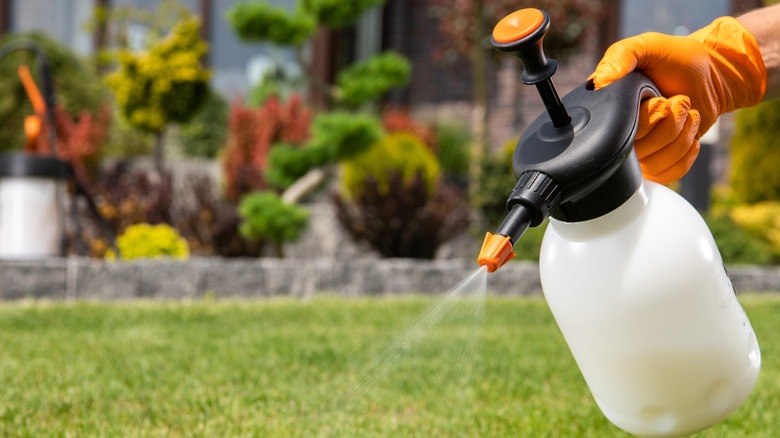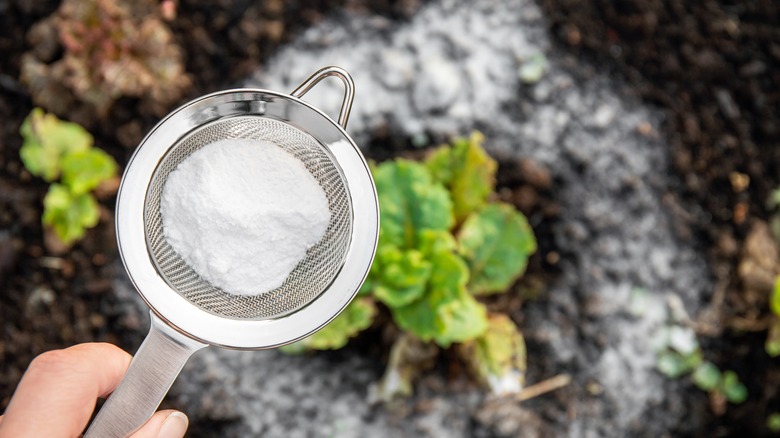Think Twice Before Using Any Of These Products When Killing Weeds
Keeping your garden free of weeds can feel like a never ending battle. Once you think you've rid your garden of these intruding plants, another pops up in a sneaky place you'd never expect. Because it is so frustrating, people have tried anything and everything to get rid of weeds. While there are many effective household remedies, some popular products actually do more harm than good. Certain ingredients found in both store-bought and homemade weed killers can cause significant harm to surrounding plants, the environment, and even your body.
You don't need to throw away everything on this list, but rather take a look at the product's formulation and how it works on plants to decide whether it is right for you. One weed killing solution that works great when tackling weeds that grow in cracks of concrete might not be the right choice to also eliminate weeds near your vegetable garden. Thinking twice about any potential downsides before you use a product will help you make the best choice for your specific garden. Here are 10 of these products that you might want to give a second thought before your next weeding session.
Boiling water
Using boiling water to kill weeds is a popular online hack due to how easy and affordable a solution it is. Using boiling water eliminates the use of harmful pesticides that are known to be bad for the environment and harmful to any pets you have running around the yard. It also doesn't require much physical action, especially if you use a kettle with a spout that is easy to pour on the weed, directly targeting the area you want to kill. With so many benefits, why is this a weed-killing method something to think twice about?
This method works because the high temperature of the water will kill any weeds it comes in contact with. Which means that while it might destroy any stalks or leaves, the roots underneath the soil will remain untouched. Even if the plant looks dead for a while, the healthy roots will eventually grow a new weed in its place. There is no way for the boiling water to stay hot enough to kill by the time it seeps down into the soil all the way to the root, so you are actually just giving the weed a hydration boost. This method can be effective if you are targeting young weeds that don't have a deep root system. So if you douse the weeds in boiling water as soon as you see them, this will be a useful method, but you might want to consider other options if you are dealing with more mature weeds.
Bleach
Can bleach kill weeds? Yes. Should you use bleach to kill weeds? Absolutely not. Pouring bleach can kill certain types of weeds, but by doing so, you will create more problems in your garden that will make unwanted growth the least of your worries. Bleach has a very high pH, and by pouring it onto plants, it will seep down into the dirt, making the soil more alkaline. This is bad because plants have a specific pH they need to be able to thrive, and most lean on the neutral to acidic side. While there are ways to add more acid to the soil, you shouldn't be using bleach to change the pH in the first place.
When using bleach for any purpose, you need to be aware of the other substances you are mixing it with, and if you use it in a garden, there is the possibility that it could come into contact with another chemical. For example, baking soda is frequently used in the garden, but if bleach gets poured over any leftover granules, it could form a toxic chlorine gas that is harmful to you and your plants. Even if you have weeds growing out of cracks in concrete or other areas that aren't on a bed of soil, a rainstorm or watering could cause the bleach to spread around your yard, so it is best to leave this product in your laundry room.
Salt
Pulling out the salt from your cupboard might seem like an environmentally friendly solution to kill pesky weeds that won't cause any harm to humans or animals. This age-old trick does work to kill weeds, being especially effective on the smaller ones, but it can also be harmful to the surrounding plants. Using too much salt makes the earth infertile, which is why armies used to pour salt on their enemies' fields to disrupt food production. This is because salt absorbs water. It will kill the weeds by pulling the water out of its roots until it dies, but it will also absorb water from the surrounding soil, killing off any other nearby plants as well.
If you don't have any other plants nearby, you can create a DIY herbicide by mixing salt, vinegar, and dish soap with a bit of water and spraying it on the weeds. Don't saturate the soil, and use the spray sparingly. Ultimately, using salt as a method of killing weeds is good for a quick fix since it is something everyone likely has in their kitchen and can be quickly applied to kill any young weeds before they grow into difficult-to-remove adults. However, make sure you assess the location of the weeds before you start so that your good plants can continue to thrive.
Vinegar
Everyone's favorite versatile cleaning product might seem like the cure to any of your household chores, and weeding is no different. Using vinegar in the garden will work to remove weeds since it is what's known as a contact killer, meaning anything it comes in direct contact with will die within a few hours or days. Don't expect to see an instantly satisfying result like you would with hand weeding, since this method does take a bit of time for the vinegar to take full effect. The harm of this method is that if the weed is large and has thick root growth, the vinegar might just kill the visible part of the plant without stopping the problem at its source. This means that the weed will eventually regrow in the same spot.
You also have to worry about any critters in the soil when using a contact killer like vinegar. Worms, salamanders, and bugs that are helpful to garden ecosystems will also be impacted by the vinegar. This will harm the critter as well as drive away the rest of the population. So, if you want to keep your yard a safe place for all plants and animals, avoid using vinegar as a weed killer unless you know the weed is young and isolated from anything else you want to keep alive.
Essential oils
With different essential oils having such a variety of benefits, people are turning to this natural alternative to solve many problems instead of chemical-filled products. Clove, peppermint, and citrus-based essential oils have all been said to be effective and safer alternatives to traditional herbicides. These oils work by destroying the leaf cuticle and cells. However, like many products on this list, it is only effective at destroying the part of the plant it comes in contact with. It won't provide long-term control or be very helpful when fighting weeds with a deep root system.
Essential oils are also expensive. They are sold in small bottles full of concentrated product, making it difficult and pricey to tackle large areas. This makes it even more difficult to provide a permanent solution since mature weeds will need a few rounds of removal before their roots are destroyed for good. While spreading some diluted essential oils around your yard would be perfect to mask the smell of other weed-killing solutions, it's best to keep the oils in the diffusers.
Rubbing alcohol
If rubbing alcohol can destroy germs while still being safe enough for skin in small quantities, it seems like it could be the perfect solution to safely get rid of weeds, right? Maybe in some circumstances, but it's not a one-size-fits-all solution. Rubbing alcohol is a non-selective killer, which means it has the same harmful effect on all types of plants. Whether it's weeds or flowers, if the alcohol comes in contact with the plant, it will draw moisture from the foliage and break down the protective outer layer of the plant. Together, this will cause it to turn brown and die within a day.
If you choose to use alcohol to get rid of weeds, use a spray bottle to keep your application precise. Try to stick to weeds coming out of concrete or rocks since there are likely fewer surrounding plants or animals that could be harmed. One helpful aspect of this method is that because alcohol evaporates so quickly, it is unlikely that runoff should be an issue. You can also use a cotton ball soaked in rubbing alcohol to dab on the specific weed you want to kill. This should be effective in targeting the unwanted growth while keeping the harmful effects of alcohol contained.
Glyphosate-based herbicides
With more studies coming out about the detrimental effects of store-bought herbicides, many people are seeking out natural alternatives. But not all store-bought weed killers are equal, and you don't have to avoid them entirely. Instead, focus on the ingredient lists and buy one that isn't glyphosate-based. Roundup is a popular weed killer brand that is glyphosate-based that you'll want to avoid. Glyphosate is an herbicide that works by stopping the plant from making certain proteins that are needed for growth.
It doesn't evaporate quickly, which means that it will stick around in the surrounding environment for a long time, potentially causing harm to bugs or animals that come in contact with the affected plants. Studies have shown that frogs who were exposed to glyphosate had weaker embryonic development than frogs who weren't. Concerns have been raised by researchers about the effects on humans since this product is often sprayed and can be easily breathed in. Although there hasn't yet been a study about the effects on humans, we know it isn't good for you. So next time you're at the garden store, take a look at what's in your usual herbicide and compare options to find one with ingredients you're comfortable with having in your home.
Herbicides containing dicamba
Dicamba is a powerful weed killer that works by using hormones to alter the growth pattern of a plant, making it grow in crazy, unsustainable ways until the plant dies. The main danger of dicamba is that it is very prone to drifting. Even a slight breeze can make the chemical take to the skies where it can float for miles and hang in the air for almost three days. This means that no matter how precise you are with the application, there is no way to ensure that it won't find its way into your vegetable garden, animals habitats, or the air we breath.
It can harm any nearby plants. Dicamba breaks down very slowly as well, and only half of the original amount will have broken down in the soil within 30 to 60 days. So if you apply dicamba, there is no changing your mind since it will semi-permanently alter the soil. This weed killer is way too powerful for home gardening uses, so stick to other methods of weed removal that are more easily controlled.
Non-selective herbicides
A lot of products on this list fall into the category of non-selective herbicides, so let's dive deeper into what this actually means. Selective herbicides are created to provide highly specific control of types of pest weeds without harming an overall lawn. The downside is that not all weeds are controlled by a single selective herbicide, and you might have multiple types of weeds or difficulty determining what exact type of weed you have. The other type is non-selective herbicides. This is most weed killers on the market, and these products will affect any plant it comes in contact with.
While this makes non-selective herbicides more effective and more cost-friendly, it makes it difficult to target weeds that are interspersed with other good plants. One application mistake can destroy your entire carefully cultivated garden. Depending on how quickly the product absorbs and evaporates, you may also run the risk of product runoff affecting other areas of your yard after rainfall or watering. You don't have to avoid non-selective herbicides forever, in fact that would be very difficult since the majority of weed-killing products are non-selective, but take a moment to think twice about where you are going to apply it and any potential downsides.
Baking soda
Baking soda can be extremely helpful in your garden as a natural pest and weed control, but it can also easily kill your plant if you're not careful. The difference is in the dosage. When used moderately, baking soda can be an affordable and effective weed killer because its salt content acts as a contact killer, damaging the plant as soon as it touches the foliage. It is a multi-use product, since the baking soda will act as an effective fungicide and pesticide, keeping other plant killers at bay. But less is more in this case, and you only get these benefits if you use baking soda sparingly.
If you use too much baking soda, it will cause a salt build up in soil, then causing desiccation (the removal of moisture) of roots and finally leaves and stems will fall off. The plant will turn brown, shrivel up, and die. So think twice about whether you want to use baking soda in your garden and if there are better solutions, like hand weeding. But if you are willing to take a chance and be careful to not spread too much, you can reap the many garden benefits of baking soda.
